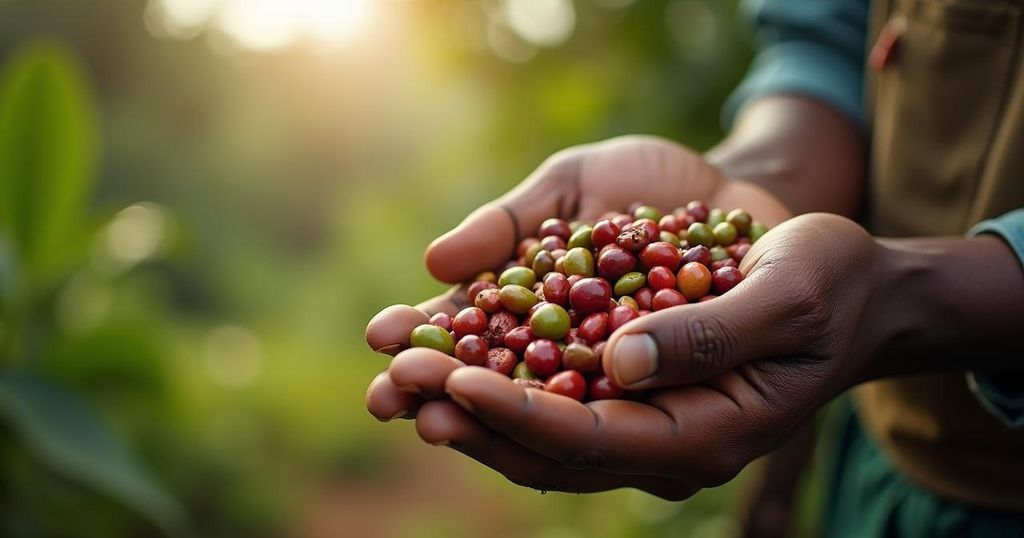Revival of Congolese Coffee: Transformation Through Quality and International Demand
The Democratic Republic of the Congo is revitalizing its coffee sector after years of decline due to conflict. With USAID’s support, local cooperatives are improving production practices and forging international connections, leading to better prices and increased confidence among farmers. A new coffee-tasting laboratory further enhances quality and marketability, marking a new era for Congolese coffee farmers with international sales and better local trading terms.
The Democratic Republic of the Congo (DRC), once a leader in the global coffee market, experienced significant downturns in coffee production and export due to extended periods of conflict and instability. Today, however, the nation is witnessing a resurgence in its coffee sector, driven by a surge in international demand for high-quality specialty coffee. Through the support of a USAID-funded initiative in South Kivu, local coffee cooperatives are modernizing their operations by enhancing production practices, identifying optimal harvesting periods, and establishing connections with international buyers. This knowledge is helping to distinguish high-quality specialty coffee from lower-value products, thus attracting better prices in the global market. The newly attained business acumen has allowed cooperatives to engage in pre-harvest financing agreements with companies such as Westrock Coffee, enabling farmers to receive payments upfront upon harvesting their crops. In 2015, the coffee cooperatives in South Kivu earned commendations at the inaugural international coffee cupping competition held in DRC. Mr. Timothy Fella, a buyer for Counter Culture Coffee, expressed his enthusiasm: “I am … trying to get my hands on as much of this coffee as possible, and I have no doubt there are buyers lined up trying to get it.” Following this success, the cooperatives successfully sold five containers of washed coffee beans to notable U.S. retailers including Starbucks and Sweet Maria’s, marking a pivotal shift in their market engagement. Previously reliant on selling to Rwandan markets, coffee farmers like Constantin Kasikagwe Mukuba, who manages his family’s quarter-hectare plot, have expressed relief at avoiding the perilous journey across Lake Kivu. “In the past, we didn’t know how to sell our coffee. We could only sell it to Rwanda.” The increased international sales have allowed local traders to offer better terms for additional coffee harvested by farmers. To further bolster the sector’s growth, USAID has facilitated the establishment of a coffee-tasting laboratory in Bukavu, the very first of its kind in South Kivu. This facility, managed by the Office Nationale du Café, enables quality certification and further education for farmers in the strict methodologies of coffee tasting, essential for elevating the coffee sector in DRC. Supported by the Kivu Specialty Coffee: Kahawa Bora Ya Kivu initiative funded by USAID and the Howard G. Buffett Foundation, the project, implemented by Catholic Relief Services, the Eastern Congo Initiative, and World Coffee Research, aims to enhance the livelihoods of small-scale coffee farmers, strengthen cooperative structures, reform government policies to foster export growth, and enhance the reputation of Congolese coffee among international consumers.
The Democratic Republic of Congo has historically been a significant player in the international coffee market. However, years of conflict and instability have negatively impacted its coffee production and export capabilities. As global interest in specialty coffee has surged, there is renewed effort to revive this important sector. USAID’s involvement has been crucial in transforming how coffee is produced, harvested, and sold, helping farmers gain insights into better practices and establishing connections with global markets. It aims to empower farmers, enhancing both their economic situations and the international standing of Congolese coffee.
The resurgence of the Congolese coffee industry signifies a hopeful turn for local farmers, who are now more empowered and knowledgeable about producing high-quality coffee. With the right tools, training, and connections, they are not only improving their livelihoods but are also reestablishing the DRC’s position in the global coffee market. The transition from a history of conflict to a promising future in specialty coffee highlights the resilience and potential of Congolese farmers.
Original Source: www.usaid.gov




Post Comment